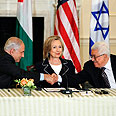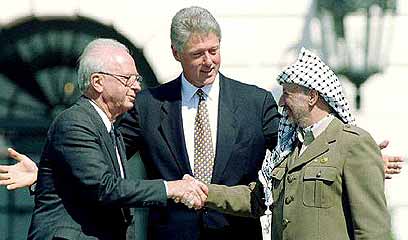
How Israel founded the Palestinian state
Ynetnews analysis: History of terrible Israeli decisions that paved way for Palestinian state
There were some weighty considerations behind the decision to oppose the establishment of a Palestinian state that are still relevant today. It was a national consensus that only the radical Left contested. However, despite clear resistance to the establishment of a Palestinian state, Israel has in fact been integral to the advancement of such a state.
The Jerusalem question
One of the main considerations behind Israel's original opposition to a Palestinian state was Jerusalem: The Muslims reigned over Jerusalem and the Land of Israel for over 1,000 years without ever declaring Jerusalem their capital. Muslim rule was briefly interrupted in Jerusalem for a century by the Crusades, who did declare Jerusalem to be their capital.
When Kurdish military leader Salah a-Din conquered Jerusalem back from the Crusaders, he continued the Muslim tradition and abstained from declaring it the capital.
This situation did not change when the Ottomans rose to power in 1517. Throughout the 400-year period of rule in the Land of Israel, the highest status given to Jerusalem was a Sanjak (district capital), which was considered an independent district and included only a small part of the Land of Israel. Haifa, Safed and Tiberias, for example, were all considered part of the Acre Sanjak.
When the British took control of the region in 1917, they declared Jerusalem the capital, continuing the Christian tradition (which is similar to the Jewish one.)

The Jerusalem question (Photo: AFP)
Israel assumed control of West Jerusalem after the War of Independence while Jordan captured the eastern part of the city. Though Israel declared Jerusalem to be its capital, Jordan continued the time-honored Muslim tradition of abstaining from declaring Jerusalem a capital and Amman remained Jordan's capital city.
An agreement with Jordan regarding the West Bank would have required an agreement regarding the Holy Sites, but the question of declaring Jerusalem the capital of two cities would not have arisen as it has with the Palestinians. For Palestinians, making Jerusalem their capital is a non-negotiable precondition, making it the first time in history Jerusalem has been called upon to be the capital of two separate states.
There are other reasons why Israel opposed the establishment of a Palestinian state. It was clear that Palestinians would present what they deem to be the "right of return" as their top priority, which of course threatens the existence of the State of Israel. Furthermore, there was also concern that even if an agreement could be reached with the Palestinians, they would still insist on returning to the borders of partition determined by the UN, which is tantamount to demanding the destruction of Israel.
On the other hand, the territory allocated for Palestinians, if they are to achieve a state, will necessarily be limited and the pressure they will exert on Israel – regarding both territory and the absorption of their population – will only increase.
The issue of demilitarization should also be noted. Most counties usually agree to demilitarize at least part of their territory. One can assume that Jordan would have agreed to demilitarizing the West Bank if it had retained it. For Palestinians, demilitarization of the West Bank and Gaza means a totally demilitarized state, and even if they were to agree to this, there is no reason to believe they would implement it.
In face of this reasoning, one would assume that Israel would do everything in its power to have reached an agreement with Jordan – but in reality the opposite was done. Despite awareness of the risks, Israel has done everything possible to strengthen the Palestinian people and now finds itself stuck between two options: a Palestinian state or a binational one.
Dayan unifies the Palestinians
In 1948, the Palestinians were dispersed throughout several countries: Jordan, Israel, Egypt, Syria and Lebanon. The territory earmarked for the Palestinians by the UN was divided between Jordan, Egypt (which got Gaza) and Israel.
Palestinians were integrated most successfully into Jordan. In Israel they were granted citizenship and voting rights, but unfortunately we did not succeed in integrating them to the point where they could identify with the country. While this could have possibly been achieved eventually, the Six Day War occured and changed everything. Israel captured territory four times its original size.
For the first time since the mandate period, most Palestinians were subject to the rule of a single regime.
Although Israel did not annex the West Bank (except for east Jerusalem) or Gaza and thus Israeli law did not apply there, then-Defense Minister Moshe Dayan opened the area and, de facto, the borders were erased. Whoever moved, for example, from Jerusalem to Bethlehem did not feel that he was exiting the formal boundaries of the State of Israel.

Dayan (L) touring Hebron. (Photo: David Rubinger)
For the Palestinians, this was the first time in decades that they could travel freely between the Gaza Strip, the West Bank and Israel, allowing for relations to strengthen and marriages to be consummated. The result was the strengthening of a feeling of Palestinian peoplehood and the formulation of political ambitions.
All these developments had side effects: the socioeconomic status of Bedouins in the Negev was higher than that of Palestinian residents of the West Bank and Gaza and thus they could easily purchase brides from these areas. Within a few years the Bedouins population in the Negev multiplied exponentially.
In addition, Israel became accustomed to cheap Palestinian labor and those Palestinians from the West Bank got to know Israel well, which ultimately became useful for terrorist groups.
After the Six Day War, Israel immediately realized the problem inherent in holding on to territory with a dense Arab population. Yigal Alon suggested a plan whereby Israel would only retain unpopulated areas in the West Bank, and return to Jordan those areas that were populated. However, King Hussein did not agree to it and negotiations with him failed.
According to the logic behind Alon's plan, Israel could settle in less populated areas that it would retain –yet as it turned out, Israel's policy was not that clear cut and no one actually knew which territories were supposed to be retained and which were slated to be returned. Moreover, it became apparent that the government lost control of the issue. During Passover 1968, a group of religious Jews rented a hotel in Hebron and refused to leave once the holiday ended. Alon, in contradiction to his own plan, supported the move, and this led to the establishment of Kiryat Arba, a settlement in the heart of dense Arab population of Hebron.
This was just one example of many where settlers set facts on the ground and the Israeli government approved it. In addition to settlement in the West Bank, Golda Meir's government initiated a plan for settling the Gaza Strip, sending a message that Israel had no intention of returning the territory to Egypt. The question of what would happen to the large Palestinian population there remained unanswered, and it seemed as if no one knew how to confront it. Maybe they were simply in denial.
Our biggest strategic mistake
Settlement in populated territories severely damaged any chance for an agreement with Jordan and only strengthened nationalist sentiment among Palestinians, who felt Jews were increasingly isolating them.
Yitzhak Rabin first took office as prime minister in 1974 following Meir's resignation, in the wake of the controversy surrounding the Yom Kippur War. At that time, discussions commenced regarding interim agreements with Egypt and Jordan.
The Arab League was scheduled to meet in October of that same year in Rabat, Morocco. Hussein requested to make an appearance at the summit, confident that he could stand up to the Palestinian Liberation Organization and demonstrate that he is capable of reaching a deal with Israel that would include withdrawal from territories. One idea was a partition agreement with Jordan which included the return of Jericho to Jordanian hands, but Rabin was interested in forming a government coalition with the National Religious Party – who rejected outright any withdrawal from territory – and thus abandoned the idea.
Hussein showed up at the summit empty-handed, and the Arab League decided that the PLO would be the exclusive representative of the Palestinian people.
A year later, Israel and Egypt signed an interim agreement that stipulated Israel give half the Sinai Peninsula back to Egypt. A settlement with Jordan, which would grant it Jericho and thus a foothold in the West Bank, dropped from the agenda following Rabin's decision.
This was the biggest strategic mistake Israel ever made.
Some 20 years later, in May 1994 in Cairo, Rabin, then serving his second term as prime minister, signed aimed to return those two territories to the Palestinian Authority. The question of whether it was better to have given Jericho back 20 years earlier to Jordan remains unanswered.
Stuck with Gaza
In the peace accord Israel signed with Egypt in 1979, it relinquished every centimeter of Sinai, but retained Gaza, which then-Egyptian President Anwar Sadat was happy to get rid of. Begin, on the other hand, was happy to embrace it.
Some 25 years later, in the summer of 2005, Israel abandoned Gaza as part of the disengagement plan. The question of whether it would have been better to demand Egypt take the Gaza Strip as part of the entire package of the 1979 treaty, instead of handing it over to Hamas, remains unanswered.
In 1979, Israel also undertook to form a Palestinian authority that would be granted autonomy. This was a dramatic step forward towards the establishment of a Palestinian state, even though at this time Jordan was still to be part of negotiations. The granting of autonomy was not implemented, and Begin continued with his policy of settlement expansion. As a result, Moshe Dayan and Ezer Weizmann resigned from Begin's government.
Following the 1984 elections, a national unity government was formed by Likud and Labor. For the first two years, Shimon Peres served as prime minister and then Yithak Shamir replaced him for the last two.
In April 1987, Peres (serving as foreign minister under Shamir) met with Jordan's King Hussein, and they reached an understanding about an international summit where Israel and Jordan would lead negotiations for a peace accord, which of course would also deal with the West Bank. Peres was committed to this process, yet Shamir completely abandoned the idea, and we will therefore never know whether this could have led to a final resolution.
The Intifada and Oslo
In December 1987, a few months after the so-called London Agreement between Peres and Hussein was rejected, the first Intifada broke out. It lasted for years, and in addition to its impact on Israelis and Palestinians, it also severely diminished Hussein's motivation to retake the West Bank, which became increasingly nationalist and militant. It appeared as if the Jordanian window of opportunity, which was first missed during Rabin's first premiership, had closed.
These factors led Rabin, during his second term, to sign the Oslo Accords with Arafat, the father of Palestinian terrorism. Arafat, who was expelled from Jordan during "Black September" and expelled from Lebanon during the first Lebanon War, returned along with his terrorist organization to center stage.
Israel agreed to the establishment of a Palestinian state, marking the final abandonment of the line of thinking it had espoused since 1967.
Israel has become convinced that it cannot continue to control territories where thousands of Palestinians reside without civil rights – and there were many who understood this from the get-go.

Handshake on White House lawn (Photo: Reuters)
The establishment of a Palestinian state was seen at the time as the worst and most dangerous option. For Israel, it has remained a difficult solution, yet surprisingly enough, even more difficult options than that have arisen.
The "vision" of a binational state has been hovering above, and it seems the Palestinians are in no rush either. The time that has passed since the Six Day War has not boded well for Israel. From the perspective of the Palestinians, time has may have worked in their favor.
Israel is again faced with a decision (inaction or continuation of the status quo also qualify as decisions.) The experience gained in the last 40 years demonstrated that when Israel has been faced with various options, it almost always, without exception, chose the worst possible one. We can only hope that this is not an indication of things to come.
- Follow Ynetnews on Facebook










